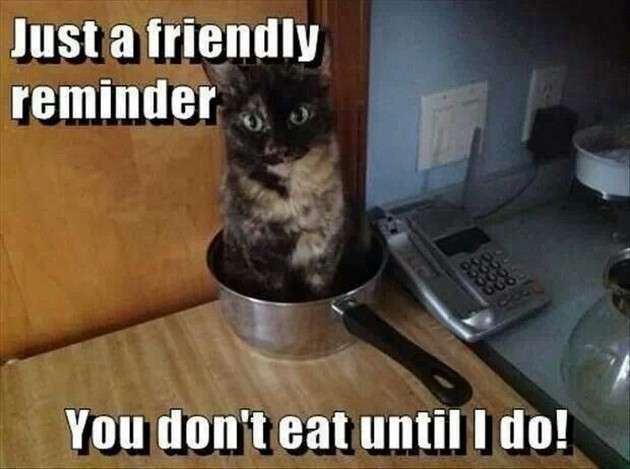Cat Tales 46

No nouns. No verbs. No ideas. I checked the clock. My copy deadline for a classical CD hove red like a shadow behind me. I type d some exploratory phrases on baroque music, then turned and yanke d open the window, usheri ng in a spring breeze that brushed the old linen drape against my arm. I deleted a string of broken words from the compute r and shivered.
Someone watc hed me as I worked. I wheeled my chair around. Eyes of bronze stared through the open window. Inte nse as lasers, tiger eyes judged me, the writer, coming up empty.
“Going to report me to the client?” I reached to touch the thin, gray kitty on the windowsill. My gesture sent the tabby scuttling off toward the nearby alley. This was the closest I’d come to the little cat. When I first noticed the skinny, feral animal prowling around, I started putting bowls of food by the garage.
Although he demolished the tuna nuggets, the wild creature scrambled off wheneve r I approached. Today, though, I did not need the distraction of cats. Time was running short.
I touched the button on my tape player, and the “Hallelujah Chorus” from Handel’s Messiah swept through my office/apartme nt, opening forgotten drawers of musical me mory. The power of the piece stirred rich ha rmonics in my mind. Finally, like a harpsichord artist, my fingers flew over the compute r keyboard. Taking a break, I rewound the tape and belte d out the “Chorus” lyrics in gratitude to Handel’s genius. To my surprise, the shy kitten leapt onto the window to listen.
I put a saucer of food near the sill in appreciation of his attendance and read my copy aloud for his approval. Afte r that morning, the gray tabby came regularly to my window. Two weeks later, I once again sang a series of hallelujahs as I revised the same liner notes, and the cat scooted through the window to join me in my simple life. As rewrite assistant, his paws played across my compute r keys. As critic, he snoozed in bore dom over any tire d literary devices.
As editor, he studied the scripts I’d stashed in the closet and carefully rearranged the pages.
Scoote r stayed busy, catching flies that stopped by uninvited or displaying the art of napping on any splash of sunshine that fell into the room. My feline compani on especially liked to sniff fresh blossoms of day lilies.* Always, when I sang Handel’s “Hallelujah Chorus,” he’d jump to the desk, cocking his head and gazing into my eyes.
Through summe r, autumn, and winte r, the drapes trembled from zephyrs, drafts, and winds. And the kitten became a cat. One day, after a long business conference, when I unlocked the apartment, no cat galloped to greet me. Instead, I found Scoote r’s still body sprawled on the floor under the desk. I picked up the limp animal and fled to the veterinary hospital, where he was rushed to e mergency for examination. The doctor’s face was grim. “Your cat’s in a deep coma. I can start an intravenous line and order tests, but . . ."
"Will he be okay?"
"Unfortunately, you’ d bette r prepare for the worst . Should I continue treatment?” The smell of antiseptic clouded my mind, but I nodde d permission. On the way home I bought a bunch of lilies. At the desk I buried my face deep inside the bouquet, hoping the pollen memory would ease the thought of losing my dear tabby. I played cat music, but couldn’ t sing. I pushed up the window and set bands of halleluiahs free to float outside. Then I cried into the folds of the faded linen drapes.
The next morning at the hospital, I produced my batte ry-operate d tape player. The receptionist led me to a room filled with pets on the mend. Scooter’s still form lay splayed like an animal rug on the bottom of his cage. “Condition unchanged. Sorry,” said the attendant filling water bowls at the sink. “I’d like to play Scooter his favorite song,” I said. “Your cat’s a music lover?"
"He’s partial to Handel. Whenever I play this piece and sing, he jumps on my desk and listens.”
The attendant thre w me a curious look.
“Honest.” I stroked soft cat fur through the bars. “Couldn’t hurt.” The attendant delivered fresh water to waiting patients. “But keep the sound down.” I pushed “play” and lowere d the volume. The room quiete d as music calmed the other animals. Through slow tears, I sang to my silent pet and watched for any sign of improve ment.
Cat Tales 47

Our vet gave us a daunting ultimatum. “His wounds are healing, but it’s only a matter of time before Harry gets seriously injured. I strongly advise you to think about eithe r keeping him in all the time or tryi ng to find a home for him a long way from othe r cats, perhaps on a farm somewhere.”
Harry is a beautifully marked tabby with the face of an angel and the mind of a thug. He does not like other cats; he does not like them anywhe re near our house or garden.
Since they no longer hung around our garde n, Harry now tracked the m down and fought the m whe rever he found the m!
After an assortment of injuries to his legs and his stomach and having had both sides of his face opened and drained from fights in battle, we knew we had to face this dilemma. On one trip to the vet, the y had to shave his paw to give him an injection, so they could operate on his face. Afterward, we kept hi m inside for a f ew days. The first time we let him out again, he returne d with fresh scars on the shaved paw, and I ended up in tears!
With our other two cats, Rosie and Brandy, Harry was no problem at all. Rosie was only eighteen months when we’ d brought Harry into the house from an animal shelter, and he regarded he r partly as mum and partly as big sister. If he was unruly in the house, Rosie gave him a smack in the face with her paw as a warning. If this warning did not work, she waited her mome nt and then stood astride hi m, trapping him underneath her superior weight. This resulted in cries for help from Harry, until we rescued him or she decided to let him go.
We could never pa rt with Harry, even though he was the cause of all the trouble in the house: locked in ward robes, stuck in drawers, stealing food, leaping across the bed in the middle of the night because he wanted to wake us up so we could chase him. He was famous in the little lane we live in for two things. First, he wrecked our neighbor’s louvere d blinds in pursuit of their cat, in their house. They had left their door ope n one summe r day, and Harry chased their cat inside and up into a bedroom. Our neighbor, Steve, walked in and heard the commotion, and Harry came flying downstairs, only to find Steve had closed the door behind him. Harry panicked and in the process ripped their blinds in an attempt to get out.
His second claim to fame involved Ste ve’s daughter, Megan, when she was around five years old. She was walking along, trailing her rag doll behind her, when Harry decided to “go for it.” He grabbed the doll out of her hand, took off ove r a fence with it in his mouth, and disappeared into some shrubs. Megan was distraught, and we all had to go and hunt for he r doll, while Harry sat in the sun cleaning himself and looking at us as if we were nuts.
Many of his fights were with a nearby cat called Sylvester. Harry was going into his house and stealing his food!
We were appre hensive about being able to make a housecat of Harry. So was the vet. We knew it woul d require patience balanced with discipline. At first, we persuaded Harry from the door by picking him up and giving him a cuddle. He even got the odd tidbit if he saw the other two had got out and he was left inside. Brandy had come to us as the lodger who stayed, and he went out a lot. Rosie was rather timid outside and generally only went out for five minutes or so, so we started to keep he r in more if Harry was in view, so as to limit the amount of ti me he was left in the house. We only let Rosie out when Harry was busy or looking out a window.
Harry has always been a window-oriented cat, rathe r than a hearth cat. Now, he spent every moment at different windows of the house. At times, we felt sorry for him, sitting at the back door waiting to be let out or at an open window, sniffing the fresh air. Whenever a cat wandered into our garden, Harry would stand on his back legs, hissing and howling. This was a good reminde r to us that if he were outside, he would be fighting with the m.
It took nine months, but he mainly accepted that he did not get out. The re are times even yet, some three years later, when he still howls at the front door.
No one, least of all us, likes to deprive a cat of his freedom, and it hasn ’t been easy. We are convinced, howeve r, that this is the only way we could stop Harry from being seriously injured, or worse. What we did took patience and time, but most of all, it took a lot of love.
Seeing Harry still in one piece is our ultimate reward. I firmly believe that if you take a cat into your life, just like a human, you must accept every part of it, the good and the bad, and in Harry’s case, the wild.





